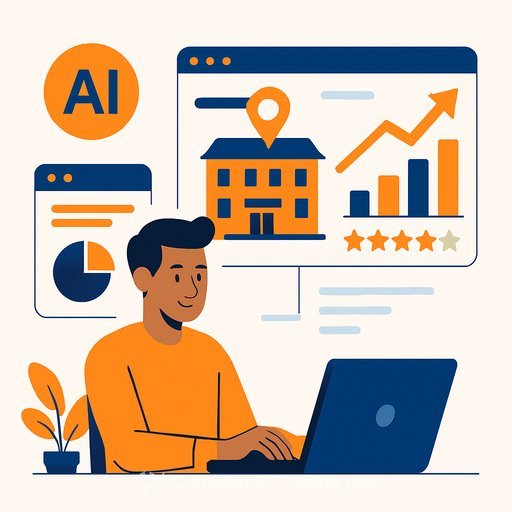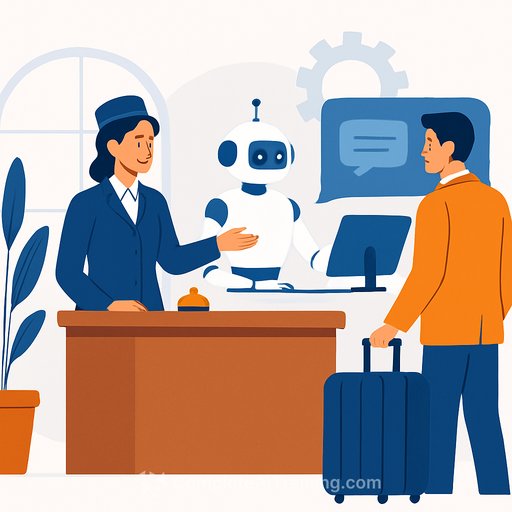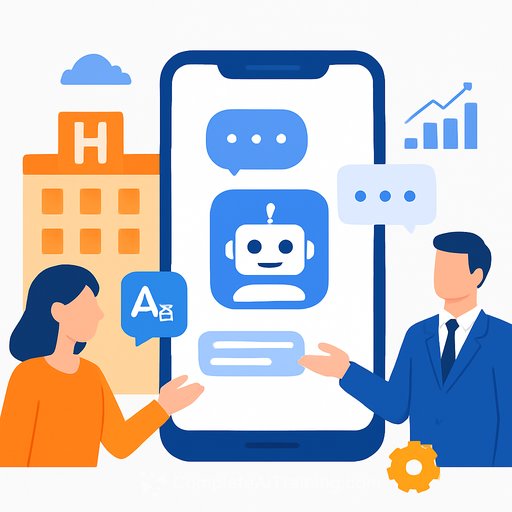Independent Hospitality's New Chapter: AI With a Human Heart
Independent hospitality-boutique hotels, B&Bs, vacation rentals, inns, and glamping sites-is moving from spreadsheets and gut calls to AI-driven decisions. The goal isn't to replace the personal touch. It's to run leaner, price smarter, and spend more time with guests.
New research from TakeUp shows the shift is real: nearly 70 percent of operators say AI adoption is important for staying competitive. Of those, 39 percent see it as a significant edge, and 30 percent say it's essential for survival. What big chains once guarded is now practical and accessible for independents.
Why AI, Why Now
Efficiency is the spark; competitiveness keeps it moving. Operators cite time savings first, then cost reduction and better positioning against nearby comps. Automating guest messaging, pricing, and routine workflows gives back hours and builds consistency.
As TakeUp's leadership puts it, AI tools have become affordable, plug-and-play, and built for operators-not engineers. Independents also have agility on their side. No legacy tech stacks. No corporate red tape. They can test, adopt, and iterate fast.
What Operators Are Automating
Top use cases today:
- Guest communication and chatbots: instant answers, faster resolutions, and fewer after-hours bottlenecks.
- Marketing, ads, and social: campaign testing, creative iteration, and budget reallocation based on real performance.
- Dynamic pricing: daily recommendations grounded in demand, comps, and pacing data.
- Energy management: optimizing usage without sacrificing comfort. See practical guidance for hotels from ENERGY STAR.
The motivation is simple: simplify the complex, amplify what makes your property unique, and stay a step ahead.
Case Study: Saratoga Arms
At Saratoga Arms, a 30-room boutique hotel in upstate New York, pricing used to be manual. General Manager Rachel Paley spent about 15 hours a week adjusting rates. There was no time for testing new strategies or deep pacing analysis.
After implementing AI-driven pricing, the system learned the property, tested price sensitivity, and delivered optimized daily rates-while keeping the team in control. Guests began booking at price points they hadn't captured before, without sacrificing occupancy.
The impact: an 11 percent year-over-year increase in RevPAR, compared with just under 2 percent across the industry. Paley also reclaimed more than 10 hours a week, shifting that time into guest service and staff development.
Accuracy improved. High-yield nights were captured more consistently. Staff morale rose because pricing was no longer a high-pressure guessing game. Confidence went up; burnout went down. And the human experience stayed central-tech handled the background work so the team could focus on names, preferences, and memorable moments.
Barriers Still in the Way
Owners cite three main hurdles: limited technical expertise, integration headaches, and fear of losing the personal touch. Cost and proof of ROI come up often. Data privacy is a concern too, with 15 percent listing it as their top worry.
The fix: start small, pick one high-impact area, and work with partners who provide real onboarding, walkthroughs, and strategy support. Don't aim for full automation on day one-ship one win, build confidence, then expand.
Keep the Human Touch
Authentic hospitality isn't doing everything manually-it's being present when it matters. Let AI handle late-night "What's the Wi-Fi?" messages, check-in logistics, and routine follow-ups. Your team can then spend time on recommendations, local insights, and thoughtful service.
Practical next moves include automated pre-arrival communications based on preferences, AI-driven concierge for simple questions, and guest profile enrichment so returning guests feel known from the moment they arrive.
What's Next: The 6-12 Month Roadmap
- Smart energy management to cut utility costs without hurting comfort.
- Guest communication automation with clear escalation to humans.
- Automated marketing campaigns that shift budget to winning channels in real time across OTAs, paid search, social, and email.
- Dynamic pricing tools that adapt to demand, events, and comp sets-daily, not weekly.
As analytics and automation tighten up, independents can reinvest savings into what guests remember: upgraded amenities, curated experiences, and genuine connection.
Quick Start Playbook
- Choose one use case with fast ROI: guest messaging or dynamic pricing.
- Integrate with your PMS and channel manager; confirm clean data flow.
- Set guardrails: min/max rates, tone of voice, escalation rules.
- Train the team; define who monitors what and when.
- Pilot for 30 days; compare against a clear baseline.
- Review results weekly; adjust settings; expand after proven wins.
Metrics That Matter
- Hours saved per week and response time to guests.
- RevPAR, ADR, occupancy, and profit per available room.
- Error rates in pricing or reservations; overbooking incidents.
- Guest satisfaction scores and review sentiment.
- Energy cost per occupied room.
- Marketing ROAS and cost per booking by channel.
- Staff turnover and training time.
Your Move
Big brands had the advantage for years: budgets, data, and teams. AI is closing that gap, and independents with speed and focus can pull ahead. The play is simple: start now, win one workflow, and compound results.
If your team needs a clear path to upskill, explore practical training options built for operators, not engineers: AI courses by job.
The properties that act today will set the standard guests expect tomorrow.
Your membership also unlocks:






